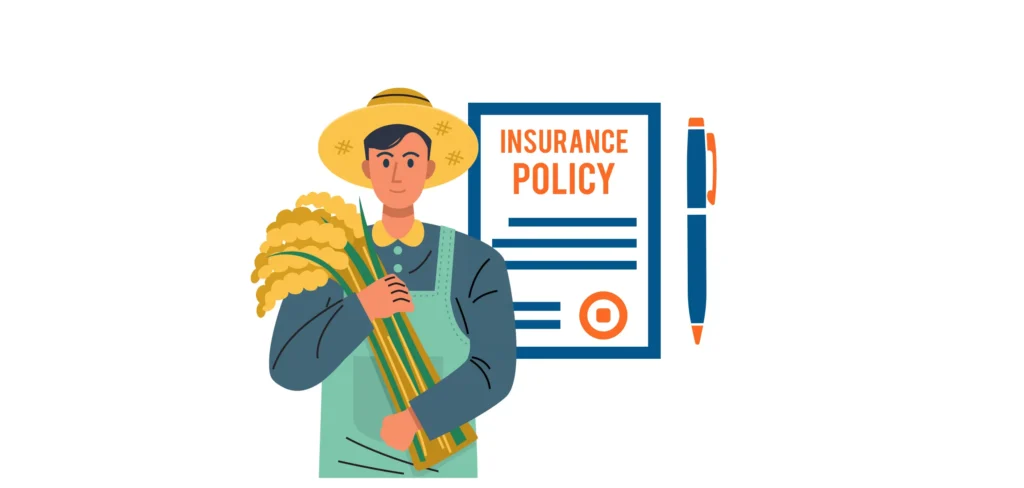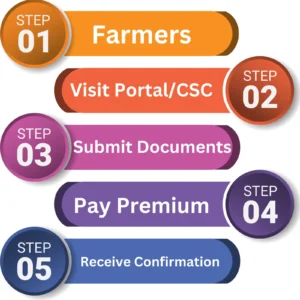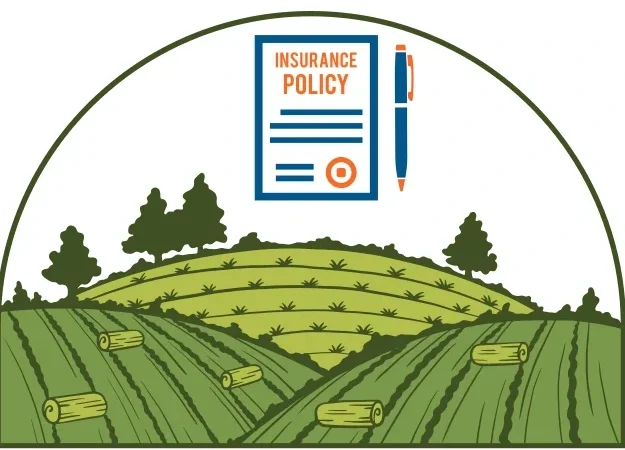What is PMFBY? An Overview of Crop Insurance
The Pradhan Mantri Fasal Bima Yojana (PMFBY) is a government-backed crop insurance scheme launched in 2016 to protect Indian farmers from losses due to natural calamities. It shields them against the financial loads caused by natural calamities and unexpected events.
Covering the entire crop cycle from pre-sowing to post-harvest, PMFBY offers comprehensive protection.

Key Features of PMFBY: Protecting Farmers from All Angles
- Risk Coverage: Offers protection from pre-sowing to post-harvest.
- Affordable Premiums: Farmers pay only 2% for Kharif crops, 1.5% for Rabi crops, and 5% for horticultural crops, with the remaining cost subsidized by the government.
- Advanced Technology: Uses satellite imagery, remote sensing, and drones to monitor crops and expedite claim settlements.
- Quick Claims: Ensures timely financial assistance for affected farmers.
What are the benefits of PMFBY?
- Low Premiums: Farmers can pay a small portion of the premium amount, with the majority being subsidized by the government.
- Wide Coverage: The scheme protects crops from multiple risks, including floods, droughts, pests, and cyclones etc.
- Fast Claim Settlements: Technical advancements expedite the claim process, ensuring quick financial relief for farmers.
- Support for Modern Farming: Farmers are encouraged to adopt modern agricultural practices, knowing they are insured. So they can take some fearless decisions for their farming.
How much premium do farmers pay for PMFBY?
| Feature | PMFBY | Other Insurance Schemes |
|---|---|---|
| Premium Rates | 2% for Kharif, 1.5% for Rabi, 5% for horticulture | Typically, higher |
| Coverage | All stages of crop production | Limited to specific stages |
| Technology Use | Drone, remote sensing, satellite data | Minimal use of technology |
Eligibility Criteria for Pradhan Mantri Fasal Bima Yojana (PMFBY)
- Loanee Farmers: Farmers who have taken agricultural loans or hold a Kisan Credit Card (KCC).
- Non-Loanee Farmers: Farmers who grow notified crops in designated areas without taking loans.
- Sharecroppers and Tenant Farmers: Eligible if they provide required land documents.
Who Is Not Eligible for PMFBY?
- Those who cannot submit necessary documentation like Aadhaar or Kishan Credit card (KCC) certificates.
- Farmers who are cultivating land but do not have documentation proving their ownership.
- Farmers cultivating on government land without a proper lease.
Alternative Insurance Options for Ineligible Farmers
For those farmers, who are not eligible for PMFBY, alternatives like the Weather-Based Crop Insurance Scheme (WBCIS) or state-level insurance programs may provide coverage. These programs often focus on weather anomalies rather than crop yield.
Step-by-step guide to applying for Pradhan Mantri Fasal Bima Yojana (PMFBY)
1. Visit the National Crop Insurance Portal (NCIP)
2. Register effortlessly with your Aadhaar and mobile number.
3. Provide essential details about your land, crops, and insurance unit
4. Upload required documents (land records, Aadhaar, etc.) quickly and easily. 5. Pay your premium online in a few simple clicks.
1. Visit your nearest bank branch, Common Service Center (CSC), or Primary Agricultural Credit Society (PACS).
2. Complete the application form and submit the required documents.
3. Premium must be paid by way of NEFT only and DD or Cheques are not accepted.

What documents are required for PMFBY?
- Pan card (If applicable)
- Aadhaar card
- Land ownership documents (e.g., Records of Rights, lease agreements for tenant farmers)
- Kisan Credit Card (if applicable)
- Bank account details (for premium payment)
- Crop loan papers (for loanee farmers)
Latest Status (2025–26)
- Scheme Status: Active and extended till 2025–26
- Budget Outlay: ₹69,515.71 crore approved by the Union Cabinet
- New Tech Push: Integration of AI and satellite data under YES-TECH & WINDS
- Grievance System: Toll-free helpline (14447) & “Krishi Rakshak” portal launched
Recent Issues & Improvements
| Issue | Fix Introduced |
|---|---|
| Delay in claim settlement | Mandated claim processing within 2 months |
| Manual yield estimate errors | YES-TECH & remote sensing-based evaluation |
| State delays in fund transfer | Escrow account mandatory from Kharif 2025 |
| Fake claims | Integrated verification and geo-tagging |
Official Sources for More Information on PMFBY:
- Official website of Pradhan Mantri Fasal Bima Yojana
- Detailed PMFBY Guidelines PDF
- Insurance Premium Calculator: Calculate here
PMFBY success stories: How Pradhan Mantri Fasal Bima Yojana Helped Real Farmers
PMFBY saved my farm after the floods last year. The claim process was smooth, and I received the compensation just in time. See his Story.
– Rahul suresh Mhaske, a farmer from Maharashtra
The insurance gave me the confidence to try new farming techniques without worrying about unexpected losses. See her story.
— Bandana das, a farmer from Odisha
Frequently Asked Questions About Pradhan Mantri Fasal Bima Yojana
Who can apply for PMFBY?
All farmers, including sharecroppers and tenant farmers, who are cultivating notified crops in the insured areas are eligible. Farmers with KCC or crop loans are automatically covered unless they choose to opt out.
How do I know if I’m eligible?
You can use the interactive Eligibility Calculator or contact your nearest bank or Common Service Center for assistance.
What crops are covered under PMFBY?
The scheme covers food crops (cereals, pulses), oilseeds, and annual horticultural/commercial crops.
What is the Pradhan Mantri Fasal Bima Yojana (PMFBY)?
PMFBY is a government-backed crop insurance scheme launched in 2016 to protect farmers from natural disasters and crop loss.
How much premium do farmers pay under PMFBY?
Farmers pay only 2% for Kharif crops, 1.5% for Rabi crops, and 5% for horticultural crops, with the government subsidizing the rest.
How can farmers apply for PMFBY?
Farmers can apply online through the National Crop Insurance Portal or offline via their nearest CSC, PACS, or bank branch. You can visit our guide.
Conclusion
The Pradhan Mantri Fasal Bima Yojana (PMFBY) is a vital initiative that protects farmers against unforeseen losses while promoting sustainable agriculture. By offering low premiums, wide coverage, and modern technology, it empowers farmers to focus on enhancing productivity without fear of financial instability.


